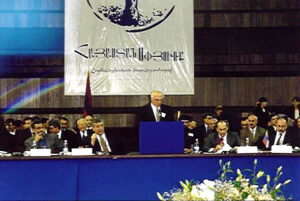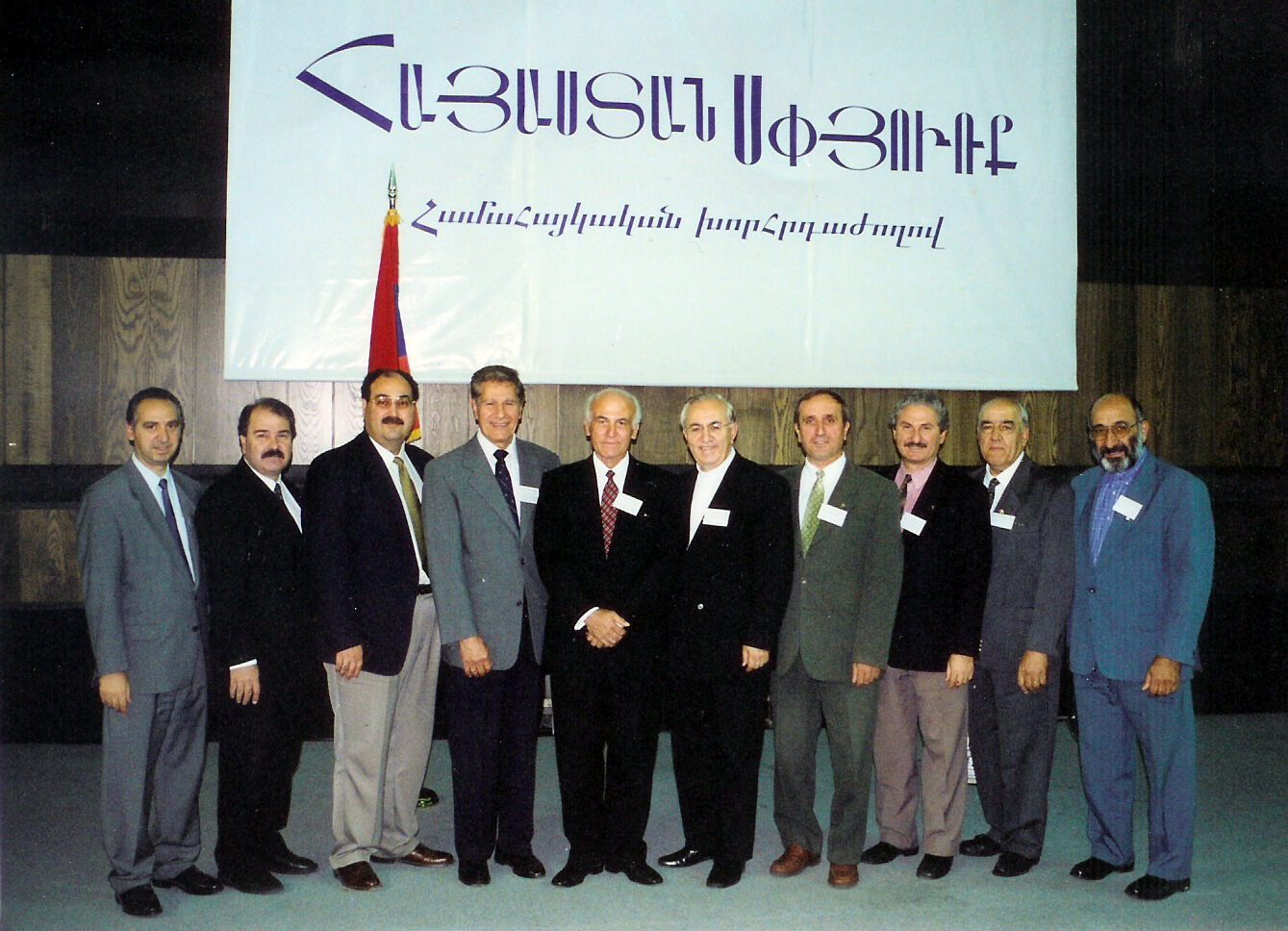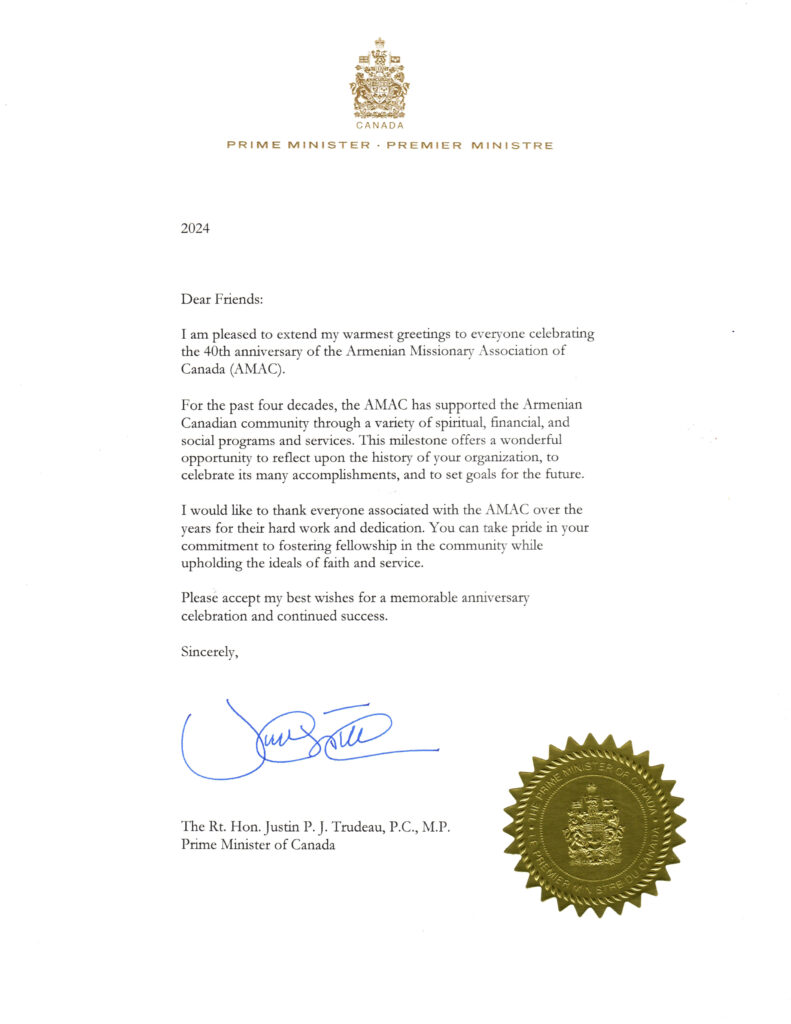Dignitaries at the First Armenia Diaspora Conference Opening in Yerevan – September 1999. From left: the 84th Armenian Patriarch of Constantinople and All of Turkey His Beatitude Archbishop Mesrob II Mutafyan, AMAA Executive Director Rev. Dr. Movses Janbazian, His Holiness Aram I Catholicos of Holy See of Cilicia, Armenian General Vazgen Sargsyan and Armenia Parliament Speaker Karen Demirchyan.
* * *
“At the Armenia Diaspora Conference in Yerevan in September 1999, as representative of the Armenian Evangelical Community, Rev. Movses Janbazian addressed the audience. But among all the political and religious speakers, Janbazian’s was the strongest and most nationalistic.”
AIM Magazine, October 2000
* * *
AMAA Executive Director Rev. Dr. Movses Janbazian’s Historical Speech at the Armenia Diaspora 1st Conference Held in Yerevan, Armenia, on September 22-23, 1999
 Your Excellencies, Presidents of the Republics of Armenia and Nagorno-Karabagh, your Holiness, and dear compatriots.
Your Excellencies, Presidents of the Republics of Armenia and Nagorno-Karabagh, your Holiness, and dear compatriots.
On behalf of the Armenian Evangelical World Council and the 155 Armenian Evangelical Churches of the Homeland and the Diaspora, we greet you with warmest Christian love. We also wish to express our congratulations and gratitude to those who conceived the idea of this Armenia-Diaspora Conference and worked hard to make it a reality.
The issues faced by Armenia and the Diaspora are many and serious. Therefore, this historic conference places a burden of heavy responsibilities and serious commitments on the shoulders of its organizers and participants. This is the reason why the Armenian Evangelical Church is present at this conference with the prayerful participation of the representatives of all Armenian Evangelical regional church unions in the world, namely, Rev. Yuri Avanesyan from Armenia; Rev. Megrditch Karagoezian from the Middle East; Rev. Dr. Vahan Tootikian from North America; Rev. Gilbert Léonian from Europe; Rev. René Léonian from the Eurasian region; Mr. Hampartsum Moumdjian from South America; Mr. Borros Halladjian from France; Mr. Andrew Torigian, representing the Armenian Missionary Association of America; and Rev. Movses B. Janbazian, Secretary of the Armenian Evangelical World Council.
Armenian Evangelicals have been an inseparable part of the life and history of the Armenian nation since 1846. Armenian Evangelicals have gone through all the horrors of massacres, genocide and statelessness that befell the Armenian people. At the same time, Armenian Evangelicals have been unreserved participants in all the strivings and achievements of the Armenian nation.
Currently, the Armenian Evangelical Church, under the blessings of God, continues to minister to our people in Armenia and in 20 other countries around the world through its more than 155 pulpits; 185 ordained ministers; 25 educational institutions; Haigazian University of Beirut (the only Armenian institution of higher learning outside Armenia); many social service centers; publications; youth centers; and significant endowments and foundations dedicated to charitable, educational and humanitarian purposes. Specially, through their missionary arm, the Armenian Missionary Association of America, Armenian Evangelicals render inestimable services to our people in the Diaspora, in the Homeland and in Artsakh.

Representatives of the Armenian Evangelical Churches worldwide at the First Armenia Diaspora Conference: L to R: Rev. Dr. René Léonian, Rev. Megrditch Karagoezian, Rev. Krikor Youmshajekian, Andrew Torigian, Rev. Dr. Movses Janbazian, Rev. Dr. Vahan Tootikian, Rev. Yuri Avanesyan, Rev. Gilbert Léonian, Hampartsum Moumdjian and Borros Halladjian
We believe that the independence of Armenia offers a special opportunity to strengthen the relationship between Armenia and the Diaspora. Therefore, Armenian Evangelicals pray and work with renewed hope for the enhancement of the mutual ties and relationship between Armenia and the Diaspora, which will benefit both of these wings of the Armenian nation. We wish to depict this relationship as a symbiotic one, which will nurture and assure the existence and prosperity of both Armenia and the Diaspora.
Our understanding of the Armenia-Diaspora mutual relationship rests on two basic premises.
The first of these premises is that all human beings who confess to being Armenian comprise one nation, the Armenian nation; they have one homeland, the historical Armenia; and both the Armenian nation and Armenia are under one flag, the red, blue and orange Armenian tricolor.
The second basic premise on which our understanding of the Armenia-Diaspora mutual relationship is based is that unity does not mean uniformity. We believe that unity is having a common purpose on essential issues and cooperation on common objectives. In other words, attainable unity in the Diaspora, and between Armenia and the Diaspora is necessarily based on the following principles: – non-negotiable and unreserved unity, and even uniformity, in essential and vital issues; – freedom and understanding in non-vital and non-essential issues; and – mutual love and respect in all issues.
The Armenian Evangelical Church believes that the following are the major essential issues the Armenian nation is facing at present:
- Maintaining the liberation and independence of Artsakh by all means, but preferably through creative negotiations and diplomatic efforts; and, at an appropriate time, the annexation of the Armenian lands of Nagorno Karabagh to the Motherland of Armenia.
- Assuring the defense and security of Armenia through adequate military preparedness, and a flexible, balanced and wise foreign policy pursued in consultation with the Diaspora. Never again should the Armenian nation be subjected to massacres and genocide! Never again should we lose any part of that tiny piece of land remained to us out of the boundless universe created by God!
- A condition of political stability and a democratic system of government in Armenia which will assure human rights, including the right to freedom of speech, conscience, religion and worship for all citizens.
- Vitalization of the economy of Armenia by overcoming the difficulties of the current blockade, implementing a market economy, faithfully adhering to the current privatization laws and regulations, adopting a practical and equitable system of taxation, and creating an atmosphere of trust and confidence for Diasporan and international financial investments and credits.
- Reformation and modernization of the educational system and institutions of Armenia so that our current and future generations will be equipped to benefit from the scientific and technological wonders of the 21st century, and our people will be enabled to compete with neighboring and other nations.
- Seeking the recognition of the Armenian genocide by a greater number of nations and international bodies through coordinated and persistent efforts by the Diaspora and Armenia, as well as pursuit of reparations for the crime, and rectification of the injustices committed against our nation.
- Halting the current emigration from Karabagh and Armenia by raising the living standards of our people through investment and creation of job opportunities.
- Slowing the assimilation of the diasporan Armenians by all possible means, and the development of an Armenian identity and sense of belongingness among the younger generation in the Diaspora through coordinated efforts by Armenia and the Diaspora.
- The bonding together of the Diaspora and Armenia by enacting a dual citizenship law in Armenia, promoting youth and student-exchange programs, creating in Armenia and Artsakh Kibbutz-type communities for diasporan young people, promoting the exchange of cultural and educational programs through mutual visits and modern technology and communication means, and ironing out the differences between the Eastern and Western Armenian dialects.
We believe that these and other issues should be discussed jointly by Armenia and the Diaspora, and the proposals issuing from these discussions should be pursued with the concerted efforts of both Armenia and the Diaspora.
We Armenian Evangelicals also have another serious concern, which relates to the current weakness of the Christian faith of our people. For various reasons, our people in Armenia and the Diaspora have lost our former spiritual values, the faith of our forebears and the vision of Gregory the Illuminator, which have played such an important role in the development of our national image, character and cultural heritage. In order to reclaim our historical and genuine national identity, we have to rediscover the Gospel-inspired holy and pure faith of our fathers. We believe that if we cannot live as a Christian nation, the independence that we have achieved, and the lands we have liberated, as well as the economic, social and scientific progress we hope to achieve, all will be in vain. It is impossible to build a good world without building up the inner spiritual world of people. It is impossible to create a noble culture, lifestyle, society or civilization without adhering to noble principles, truth, and spiritual values, the purest source of which is God the Creator, the Lord and the Savior of the universe.
Therefore, it is our highest hope and ardent prayer that when during the first year of the third millennium we joyfully and with pride celebrate the 1700th anniversary of the adoption of Christianity as the state religion of Armenia, all of us in Armenia and in the Diaspora will experience the beginning of a new spiritual revival at government, church and community levels, and we shall once again rededicate ourselves as a nation to Jesus Christ.
In 301 A.D. our forebears made a covenant with Jesus Christ. If we fulfill our commitment to that covenant, then God will abundantly bless our small but precious nation, and He will make our nation a source of blessings not only to its sons and daughters, but also to its neighboring peoples and to all humanity. We believe that this is our nation’s reason for being; this is our people’s mission in the world; and this is the God-ordained destiny of our Haigaznian (Armenian) race.
May God bless the Republic of Armenia and the children of our nation living in the Motherland and in the Diaspora, now and always. Amen.



